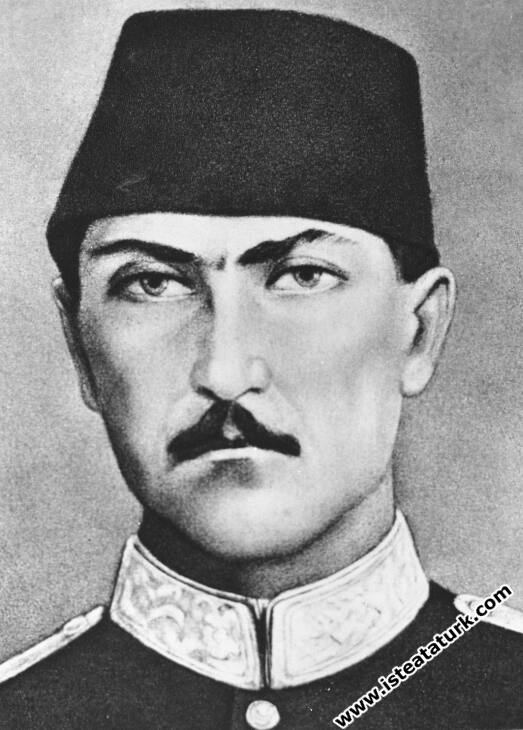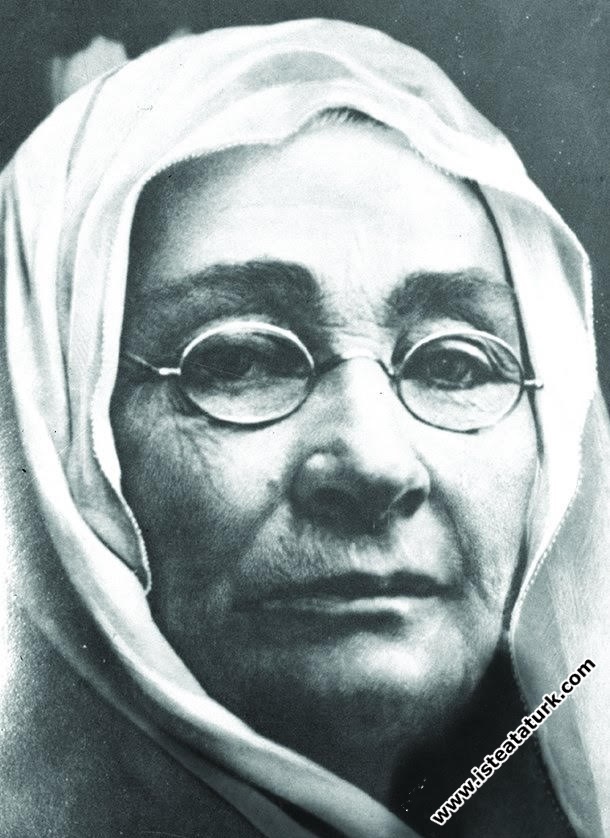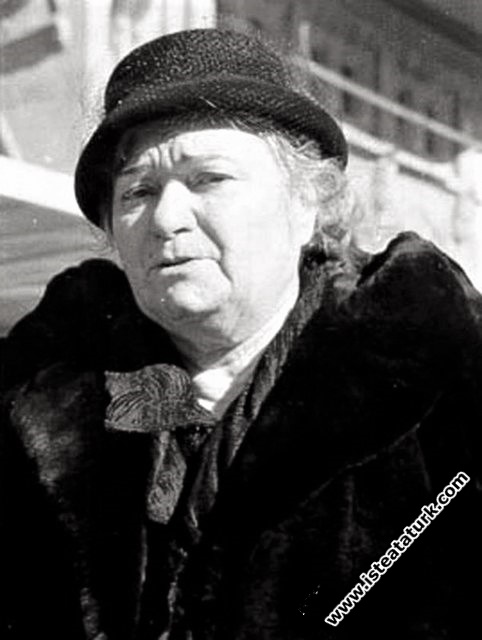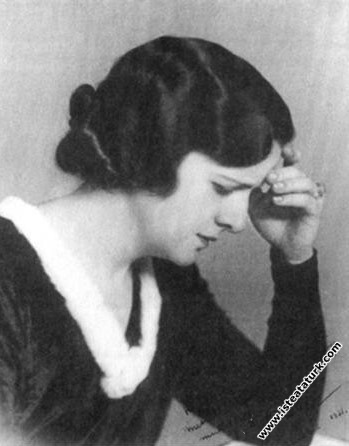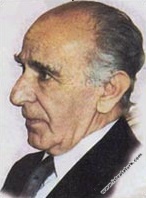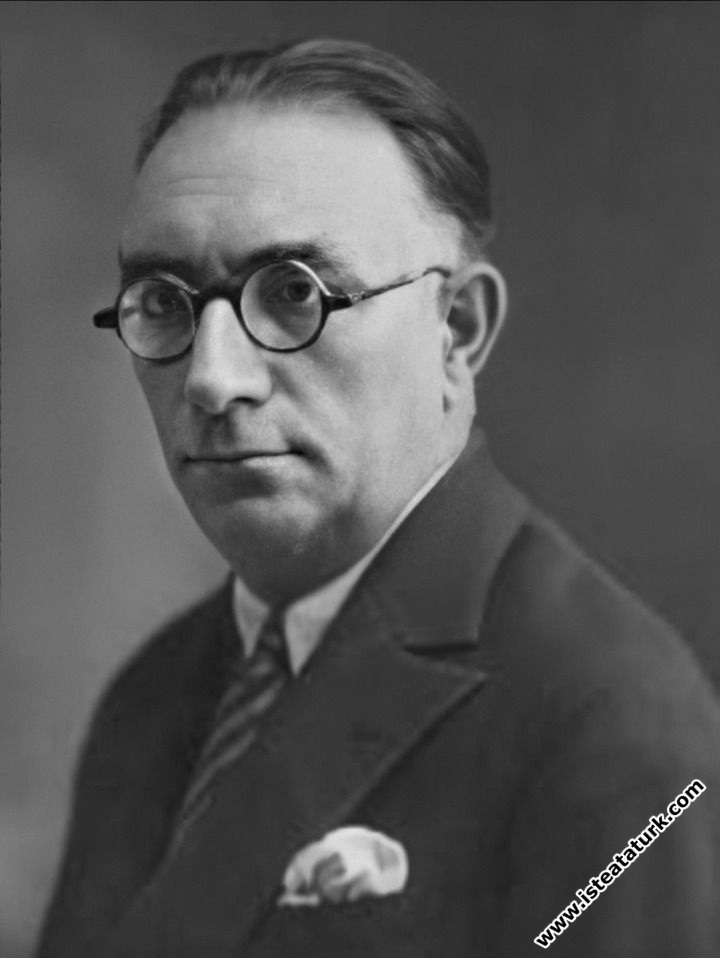
Mehmet Nuri Conker (1881-1937)
Character Size
Life of Mehmet Nuri Conker
MEHMET NURİ CONKER
He was born on 13 October 1881 in Thessaloniki. His father was Hoca Osman Efendi and his mother was Zehra Hanım. Mehmet Nuri, who was a neighborhood friend with Mustafa Kemal, graduated from Thessaloniki Military High School and the Manastır Military High School. He graduated from the Military Academy on March 14, 1900, with the rank of infantry officer on December 6, 1902. He continued his education at the Military Academy. On November 5, 1905, Mümtaz graduated from his school as Captain.
Throughout his education life, he studied at the same schools as Mustafa Kemal and his friendships continued. He started his duty in the 3rd Army in Thessaloniki on 17 October 1906. On March 20, 1907, he was appointed as the Deputy Commander of the 5th Sniper Battalion of the same army. Upon the outbreak of the March 31st Uprising, he voluntarily joined the Movement Army, which was prepared in Thessaloniki in 1909, and came to Istanbul. Taşkışla participated in his work. He was among those who besieged the Maçka Barracks. He was the aide of Mahmut Şevket Pasha. In 1910, he participated in the Albanian campaign. In the same year, he passed the staff exam. On 26 August 1910, he was appointed as the Director and Commander of the Junior Military Academy, which was newly established in Thessaloniki. His staff was approved on March 28, 1911, and he was appointed Chief of Staff of the Skopje Redif Division on June 22, 1911. In the Tripoli War that started in 1911, under the pseudonym "Naci", participated voluntarily. He became Kolağası (Senior Captain) on 5 November 1911. On January 2, 1912, he was appointed Chief of Staff of the General Benghazi Forces Command. He was promoted to Major on June 5, 1912. Mehmet Nuri, who fought with Mustafa Kemal in the 3rd Army, the Movement Army, the Albanian Operation, the Tripoli and Benghazi wars, returned to Istanbul on 16 October 1912. Upon the start of the Balkan War, he was assigned to the Çanakkale Strait Crew Forces Erkan-ı Harbiye Delegation. He returned to Istanbul on 16 October 1912. Upon the start of the Balkan War, he was assigned to the Çanakkale Strait Crew Forces Erkan-ı Harbiye Delegation. He returned to Istanbul on 16 October 1912. Upon the start of the Balkan War, he was assigned to the Çanakkale Strait Crew Forces Erkan-ı Harbiye Delegation.
On February 8, 1913, he was wounded in the knee in the battle with the Bulgarians in Bolayır locality. On April 27, 1913, he was sent to Germany for treatment. On his return, he was first assigned to the 2nd Division of the General Staff, and then to the Chief of Staff of the 1st Division on January 8, 1914. In April 1914, he compiled and expanded the lectures he gave in the winter of 1913 and published his book named “Officer and Commander”. This book of his was instrumental in Mustafa Kemal's writing a book as well. As a matter of fact, in the same year, Mustafa Kemal wrote his work titled “The Officer and the Commander and Hasbıhal” and dedicated it to Nuri Bey. Mehmet Nuri was appointed commander of the 24th Regiment of the 3rd Corps in Balıkesir on 13 July 1914. Upon the start of the First World War, he was sent to Çanakkale. Mehmet Nuri, who participated in the Battles of Anafartalar and Conkbayırı in 1915, He was side by side with Mustafa Kema in the homeland struggle given here. So much so that he even witnessed the moment when his bullet hit the clock in Mustafa Kema's chest in Conkbayırı. He was seriously injured in his right temple on 10 August 1915 in Conkbayırı. He was treated at Pangaltı Hospital.
He was promoted to lieutenant colonel on 5 September 1915 and appointed to the 8th Division Command. At the beginning of 1916, he was transferred to the Caucasian Front with his division. Here, he fought against the Russians in the forces under the command of Mustafa Kemal Pasha. On April 23, 1917, he was sent to The Hague as an Attaché. He came to Ankara on 13 June 1920 and joined the National Struggle. On 17 June 1920, he was appointed to Ankara as the governor and deputy commander. He left this post on September 16, 1920 and was appointed as the Commander of the 41st Division and the Deputy Governor of Adana. He fought the French on the Southern Front. He was sent to Germany on a special mission on 27 February 1921. In addition to this duty and upon the request of the Ministry of Foreign Affairs, on March 2, 1921, he assumed the semi-official office of Berlin Representative. He was promoted to staff colonel on September 1, 1921. He returned to the country in 1923. Parliament's II. He participated in the term elections. He was elected as a deputy from Kütahya in the elections held on 12 July 1923. He joined the Assembly on 11 August. He retired from military service on July 4, 1927.
Mehmet Nuri, at various stages of his military service, was named Kilincli Third Majidi, Fourth Rank Osmani, German Red Crowned Military, German Third Rank Egi Lipstick, German Demir Salib, Austro-Hungarian Second Class Crew-i Military, Ottoman Combat Silver Merit, Dutch Commander Rank Sword Orange. He was rewarded with medals and decorations such as Nase. However, the most valuable one for him was the Independence Medal, which he received in 1927. III of the Turkish Grand National Assembly. Mehmet Nuri, who entered the parliament as a Gaziantep deputy during his term, joined the Free Republic Party, which was founded in 1930, upon Mustafa Kemal's request and assumed the General Secretary of this party. After the enactment of the surname law, Atatürk gave Mehmet Nuri the surname “Conker”, in reference to the heroic duty he performed in Conkbayırı. Conker, IV. He entered the Grand National Assembly of Turkey as a Gaziantep deputy. Conker, who knows French and German very well, attended the IV. During his term, he also served as the Deputy Speaker of the Grand National Assembly of Turkey. In every period of his life; Conker, who was with Atatürk during his childhood, student, military service, later in the Republican era, in his residences in Çankaya, Dolmabahçe and Yalova, and in almost all his country tours, became ill on January 7, 1937. He was hospitalized with a diagnosis of "angine de poitrine" (severe heart pain). However, he could not be saved despite all the interventions and he died on 11 January 1937 at 20:05. Conker, who was next to Atatürk during the Republican era, in his residences in Çankaya, Dolmabahçe and Yalova, and in almost all his country tours, and was among the permanent members of Atatürk's table, fell ill on January 7, 1937. He was hospitalized with a diagnosis of "angine de poitrine" (severe heart pain). However, he could not be saved despite all the interventions and he died on 11 January 1937 at 20:05. Conker, who was next to Atatürk during the Republican era, in his residences in Çankaya, Dolmabahçe and Yalova, and in almost all his country tours, and was among the permanent members of Atatürk's table, fell ill on January 7, 1937. He was hospitalized with a diagnosis of "angine de poitrine" (severe heart pain). However, he could not be saved despite all the interventions and he died on 11 January 1937 at 20:05.
Conker's death deeply affected Atatürk, who saw him as "a real brother". Atatürk expressed his sadness in a letter he wrote to Afet Inan, “The sadness of Hatay was mixed with the pain of Conker's death; You can guess the depth of the wound caused by this pain”. Conker's funeral was held with an official ceremony on January 13, 1937, and he was buried in Ankara Military Cemetery at Atatürk's request. Conker on his last journey; His family, friends, all government members and parliamentarians, especially İnönü, were also sent off by a large mass of people. Atatürk, who could not attend the funeral because he was out of Ankara, was represented by İsmail Hakkı Bey, the Commander of the Guard Regiment.
Murat BURGAÇ
SOURCE
Akşam, Cumhuriyet, Son Posta, Tan Gazeteleri, 12-14 Ocak 1937.
ATATÜRK, Mustafa Kemal, Zabit ve Kumandan ile Hasbihal, Türkiye İş Bankası Yayınları, İstanbul 2006.
Atatürk’ün Nöbet Defteri 1931-1938, Toplayan: Özel Şahingiray, TTK Yayınları, Ankara 1955.
CONKER, Mehmet Nuri, Zabit ve Kumandan, Türkiye İş Bankası Yayınları, Ankara 1959.
İNAN, Afet, Atatürk’ten Mektuplar, TTK Yayınları, Ankara 1981.
İNAN, Afet, Atatürk’ün Askerlik Üzerine Kitapları (1908–1918), Türkiye İş Bankası Yayınları, Ankara 1959.
ÖZTÜRK, Kazım, Mehmet Nuri Conker, Türk Parlamento Tarihi-TBMM II. Dönem 1923–1927, C. III, TBMM Basımevi Müdürlüğü, Ankara 1995.
SARIHAN, Zeki. Kurtuluş Savaşı Günlüğü, C. IV, TTK Yayınları, Ankara 1996.
SÜSLÜ, Azmi, BALCIOĞLU, Mustafa, Atatürk’ün Silah Arkadaşları ve Atatürk Araştırma Merkezi Şeref Üyeleri, ATAM Yayınları, Ankara 1999.
YÜCEL, Hasan Ali, Nuri Conker’in Biyografisi, Zabit ve Kumandan, Türkiye İş Bankası Yayınları, Ankara 1959.
